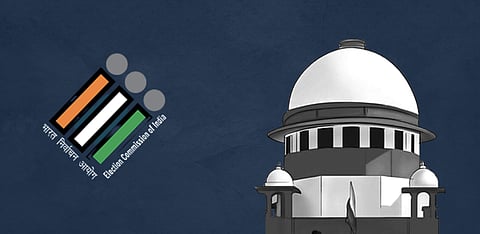

The Supreme Court directed the constitution of a committee consisting of the Chief Justice of India, the Prime Minister and the Leader of Opposition in the Lok Sabha to decide the appointment of ECI members. This committee will function till the Parliament enacts a law in this regard.
—-
TAKING away the executive's sole discretion over Election Commission of India (ECI) appointments, the Supreme Court on Thursday directed the constitution of a committee consisting of the Chief Justice of India, the Prime Minister and the Leader of Opposition in the Lok Sabha to decide the appointment of ECI members. This committee will function till the Parliament enacts a law in this regard under Article 324(2) of the Constitution.
A Constitution bench of the court, led by Justice K.M. Joseph, and comprising Justices Ajay Rastogi, Aniruddha Bose, Hrishikesh Roy and C.T. Ravikumar, was unanimous in its ruling on the constitution of the committee. However, Justice Rastogi delivered a separate concurring judgment highlighting additional aspects on the security of tenure of ECI members.
"The Election Commissioners will be appointed by the President of India on the advice of a committee consisting of the Prime Minister, and leader of Opposition in Lok Sabha, or leader of the largest opposition party in cases where there is not enough numerical strength for a leader of opposition, and the Chief Justice of India," the bench ruled.
Article 324(2) stipulates that the appointment of the Chief Election Commissioner and the Election Commissioners shall be made by the President "subject to the provisions of any law made in that behalf by the Parliament".
The court's ruling today imposes a further expectation on the Parliament to enact a law specifying the process of appointment of ECI members.
The court rendered its decision on a batch of petitions seeking the constitution of a neutral selection body for the appointment of Election Commissioners filed by advocate Anoop Baranwal and the non-government organisation Association for Democratic Reforms, among others, in 2021.
"Democracy can succeed only insofar as all stakeholders uncompromisingly work at it, and the most important aspect of democracy is the electoral process, the purity of which alone can truly reflect the will of the people so that the fruits of democracy are truly reaped," Justice Joseph observed in his judgment. "The fate of political parties and its candidates, and therefore, of democracy itself, to a great measure, is allowed to rest in the hands of the Election Commission."
To ensure the financial independence of the ECI, the bench appealed to the Union government and the Parliament to constitute a separate permanent secretariat for dealing with the expenditure of the ECI. In his judgment, Justice Joseph stated that the ECI has to perform the "arduous task of remaining aloof" from the executive, for which its financial independence is necessary.
Stating that various commissions in the past have highlighted the unequal security of tenure enjoyed by the Chief Election Commissioner and the two Election Commissioners, Justice Rastogi in his judgment ruled that all ECI members must be governed by the same rules, that is, their terms of service cannot be varied to their disadvantage post appointment, and the process for their removal shall be same as that of a Supreme Court judge, until specific provisions are enacted by the Parliament in this regard.
As per Article 324(5), while the Chief Election Commissioner enjoys the same security against removal as a judge of the Supreme Court (that is, they can only be removed through a resolution passed by a majority of Lok Sabha and Rajya Sabha members) and the conditions of service of the Chief Election Commissioner cannot be varied to their disadvantage after their appointment, the two Election Commissioners do not enjoy such security.
Click here to read the judgment.